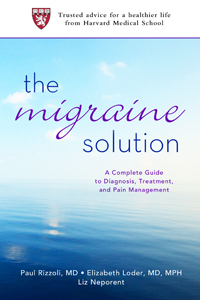It’s hard to imagine fearing an orange. Or a teaspoon of vinegar. Or a banana. But that’s exactly how many people feel. They’re convinced that eating certain foods will bring on a major whopper of a headache. Is this a legit concern?
“Although many people believe that some foods may trigger a migraine, the evidence remains a bit fuzzy,” says Elizabeth Loder, MD, MPH, the chief of the Division of Headache and Pain at the Brigham and Women’s Hospital in Boston and who along with Paul Rizzoli MD wrote the just-released The Migraine Solution.
Loder points out that it’s especially challenging to track food triggers because different foods may affect different people in different ways. There’s also no consensus about how long it might take a dietary culprit to set off a headache so it’s difficult to pin down which foods are the real trouble makers.
For example, chocolate is one food in particular where the research is mixed. You may believe that chocolate sets off a migraine, but Loder notes that a craving for chocolate could be an early warning sign that a migraine is about to strike rather than its cause. “You have to be cautious and not jump to conclusions about how the two things are linked,” she points out.
No Argument Here
What doesn’t seem to be controversial is the role of alcohol as an important headache trigger. A few sips of wine and many people report they can’t function for an entire day. Alcohol can have an immediate (within three hours) or delayed “hangover” effect and Loder says that some of her patients report getting a headache within minutes of taking a drink. Paradoxically, light and moderate drinkers seem to be more susceptible to a head banger than heavy drinkers, possibly because regular drinkers might not hoist a glass in the first place if alcohol made them really sick.
But is red wine more likely to trigger a migraine than white wine, beer or hard liquor? Maybe, maybe not. The cause of an immediate alcohol-triggered headache is probably somehow related to dilation of blood vessels in the head. But according to Loder, the exact cause of a hangover headache is less understood. “It may be due to alteration of sleep patterns, some type of inflammation, the depletion of magnesium, or some other indirect effects,” she comments.
Skipping meals seems to be another sure way to beg for a headache for many. “Fasting may alter brain chemicals or hormones or shift the metabolic processes somehow,” Loder explains, adding that going for as little as five hours without food is enough to bring on a pounding headache in some people.
Could Go Either Way
For migraine sufferers, caffeine is both good and bad news. The good news is that you may ease a migraine by sipping coffee. Caffeine is a mild pain reliever; it helps constrict blood vessels and can increase the absorption of other pain medications. That’s why starting the day with a cup of java or a can of soda can help prevent headaches.
Now for the bad news. Once the stimulating effects of caffeine wear off, you can crash hard, especially if you’ve skipped a meal. And, as a diuretic, caffeine may dehydrate you. Regular use of fairly ordinary amounts of caffeine, particularly in women, can increase likelihood of the headache worsening over time, though experts aren’t sure why.
Loder cautions about two other problems related to caffeine: “Drinking too much caffeine may initially make you feel better but later lead to a “rebound” headache and abruptly stopping or greatly reducing caffeine can lead to a withdrawal headache.”
The Bottom Line
If you suspect a certain food is a trigger –avoid it! However, headache clinics like Loder’s recognize that the considerable effort involved in starting and maintaining a hardcore “anti-migraine diet” may not be worth the typically meager results. “We counsel patients to watch for associations between what they eat and how they feel but not to get so caught up in the process that they make themselves crazy,” Loder says.
For more information on how to manage migraines and other headaches, checkout Harvard Medical School’s The Migraine Solution written by Elizabeth Loder, MD, MPH, Paul Rizzoli, MD, FAAN and Liz Neporent.
The Migraine Solution Giveaway
WINNERS: CINDI and JEFFREY
On January 18, 2026 we’ll be giving away two copies of The Migraine Solution. Just post a comment here telling us how you manage your headaches or migraines.
